Mental fatigue can severely hinder athletic performance, impacting focus and energy levels. This article explores the causes of mental fatigue, effective recovery strategies, and unique approaches like mindfulness and visualization. Athletes will learn how to trust themselves and implement methods to enhance recovery and performance. Prioritizing rest, nutrition, and mental clarity is essential for overcoming fatigue and achieving peak performance.
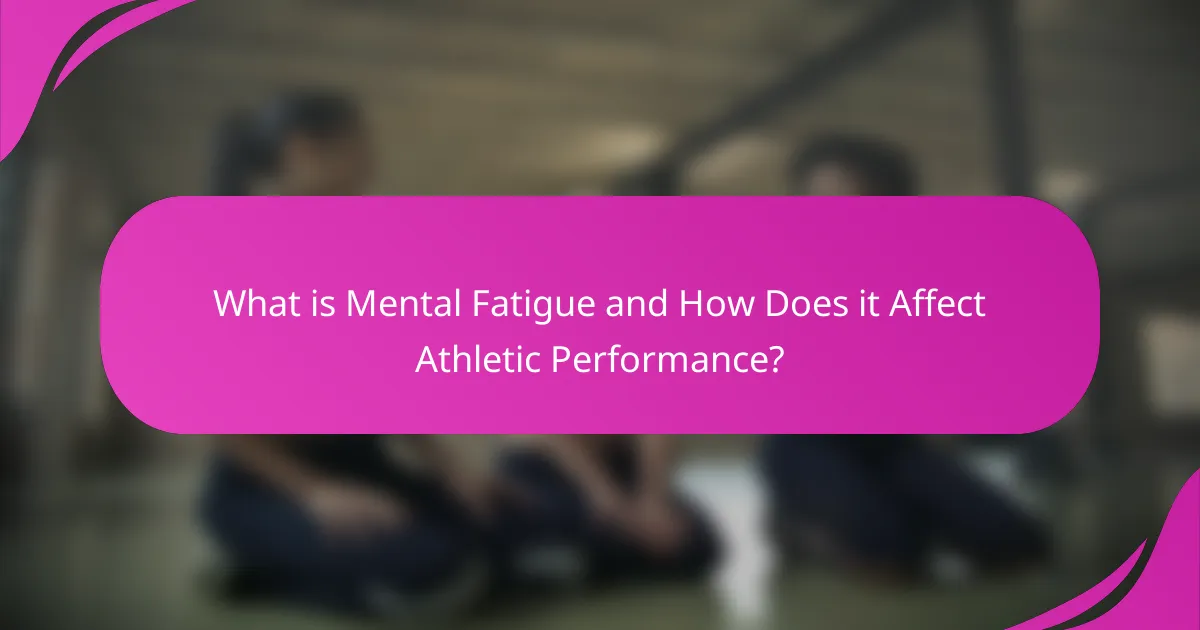
What is Mental Fatigue and How Does it Affect Athletic Performance?
Mental fatigue significantly impairs athletic performance by reducing focus, motivation, and energy levels. Athletes experiencing mental fatigue may struggle with decision-making and reaction times, leading to decreased effectiveness in training and competition. Research indicates that mental fatigue can diminish endurance and increase perceived effort during physical activity. To overcome mental fatigue, athletes should prioritize recovery strategies such as adequate sleep, mindfulness practices, and balanced nutrition. These approaches support mental clarity and enhance overall performance, ensuring athletes can trust themselves to perform at their best.
What are the signs and symptoms of mental fatigue in athletes?
Mental fatigue in athletes manifests through decreased motivation, increased irritability, difficulty concentrating, and feelings of exhaustion. These signs can hinder performance and recovery. Monitoring mental states is crucial for optimal athletic function. Athletes may also experience sleep disturbances and heightened anxiety, impacting overall well-being. Recognizing these symptoms early allows for timely interventions, promoting better mental health and performance outcomes.
How does mental fatigue differ from physical fatigue?
Mental fatigue primarily involves cognitive exhaustion, while physical fatigue relates to bodily tiredness. Mental fatigue impacts decision-making and focus, hindering athletic performance. In contrast, physical fatigue affects muscle function and endurance. Both types of fatigue require distinct recovery strategies for optimal athletic performance.
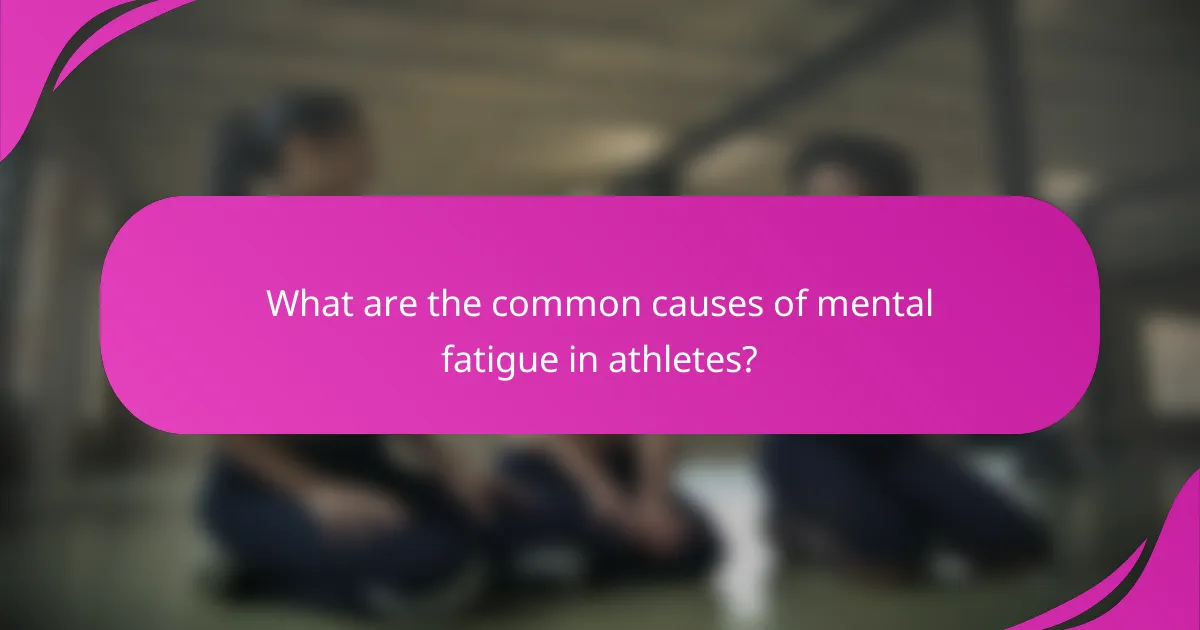
What are the common causes of mental fatigue in athletes?
Mental fatigue in athletes commonly stems from prolonged training, inadequate recovery, psychological stress, and nutritional deficiencies. These factors can hinder performance and delay recovery. Prolonged training leads to physical exhaustion, while inadequate recovery fails to replenish energy levels. Psychological stress from competition or personal life can exacerbate mental fatigue. Nutritional deficiencies, particularly in carbohydrates and hydration, can impair cognitive function and overall performance. Addressing these causes is crucial for peak athletic recovery and performance.
How do training schedules contribute to mental fatigue?
Training schedules can significantly contribute to mental fatigue by imposing physical and psychological stress. Intense routines often lead to overtraining, which diminishes cognitive function and motivation. As a result, athletes may experience burnout, impacting recovery and performance. Balancing training intensity with adequate rest is crucial to mitigate these effects.
What role does competition pressure play in mental fatigue?
Competition pressure significantly contributes to mental fatigue by increasing stress levels and cognitive load. Athletes often face heightened expectations, which can lead to anxiety and decreased focus. As a result, prolonged exposure to competition pressure can impair recovery and performance. Managing this pressure through mental strategies is crucial for optimal athletic performance. Techniques such as visualization and mindfulness can mitigate the effects of competition pressure, promoting mental resilience and enhancing recovery.
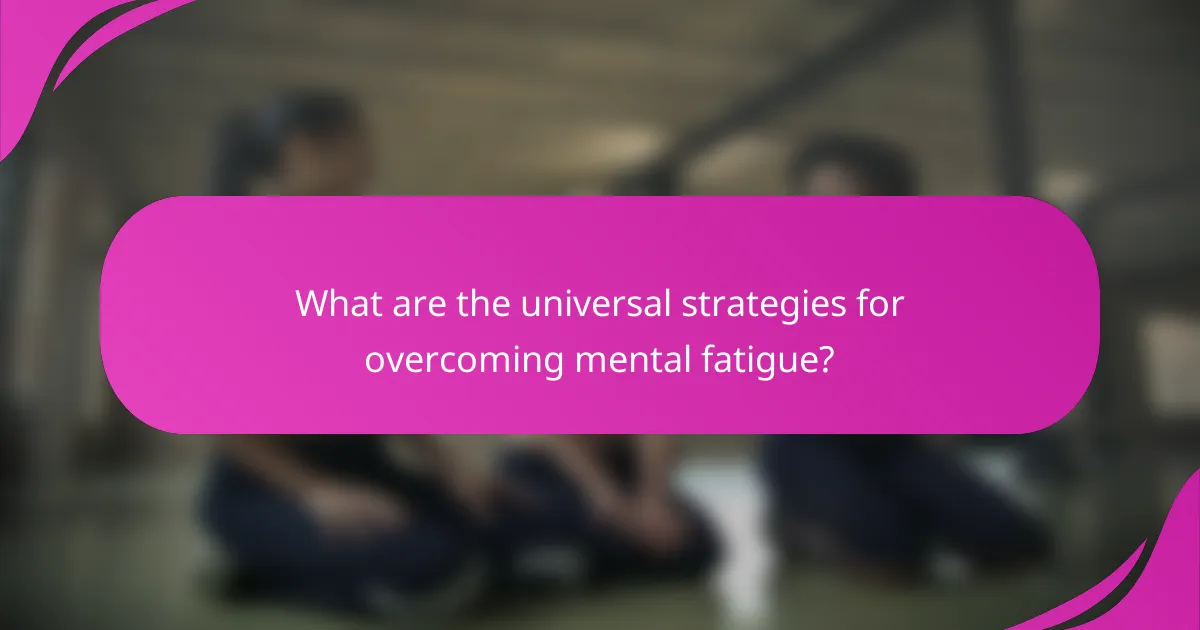
What are the universal strategies for overcoming mental fatigue?
To overcome mental fatigue, trust yourself and implement effective strategies. Prioritize rest and recovery, as adequate sleep enhances cognitive function. Incorporate mindfulness practices, such as meditation, to improve focus and reduce stress. Regular physical activity boosts mood and energy levels, supporting mental clarity. Set realistic goals to avoid overwhelm, fostering a sense of accomplishment. Lastly, maintain a balanced diet rich in nutrients to fuel both body and mind.
How can rest and recovery improve mental resilience?
Rest and recovery significantly enhance mental resilience by allowing the mind to recharge and process experiences. Adequate rest reduces cortisol levels, which can improve focus and decision-making. Recovery practices such as mindfulness and sleep promote emotional regulation, leading to better performance under pressure. Engaging in restorative activities fosters a positive mindset, which is crucial for overcoming mental fatigue. Prioritizing these practices supports athletes in achieving peak performance and maintaining mental clarity.
What techniques can athletes use to enhance mental focus?
Athletes can enhance mental focus through techniques like visualization, mindfulness, and goal-setting. Visualization involves imagining successful performance, which boosts confidence and concentration. Mindfulness practices, such as meditation, help athletes remain present, reducing distractions. Goal-setting establishes clear objectives, maintaining motivation and focus during training and competition.
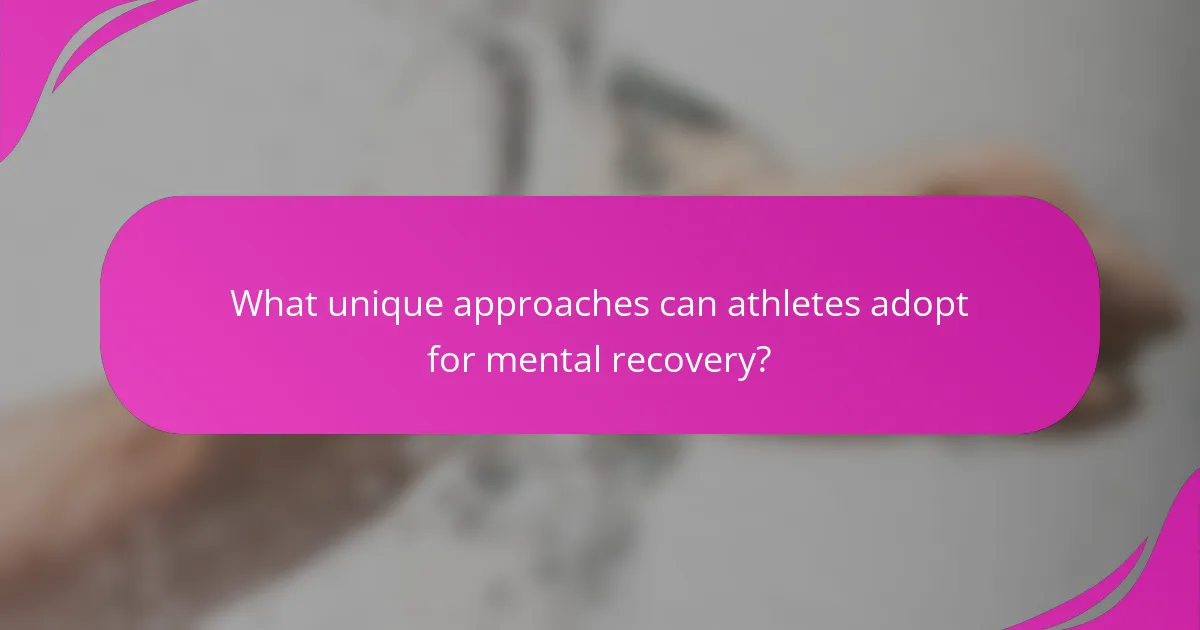
What unique approaches can athletes adopt for mental recovery?
Athletes can adopt unique approaches like mindfulness, visualization, and structured downtime to enhance mental recovery. Mindfulness techniques reduce stress and improve focus, while visualization helps in mentally rehearsing performance scenarios. Structured downtime allows athletes to recharge mentally, preventing burnout. These methods foster resilience and enhance overall performance.
How can visualization techniques aid in overcoming mental fatigue?
Visualization techniques can significantly reduce mental fatigue by enhancing focus and motivation. These techniques, such as imagery and mental rehearsal, enable athletes to mentally simulate performance, which can foster a sense of control and readiness. As a result, athletes experience reduced stress and improved recovery, allowing for peak performance. Additionally, studies indicate that visualization can activate neural pathways associated with physical execution, reinforcing the mind-body connection essential for athletic success.
What is the impact of mindfulness practices on athletic performance?
Mindfulness practices significantly enhance athletic performance by improving focus, reducing anxiety, and promoting recovery. Athletes who engage in mindfulness report better emotional regulation, which translates into improved performance under pressure. Studies indicate that mindfulness can lead to a 10-20% increase in performance metrics, such as endurance and strength. This improvement stems from enhanced mental clarity and reduced mental fatigue, allowing athletes to trust their instincts and maintain peak performance.
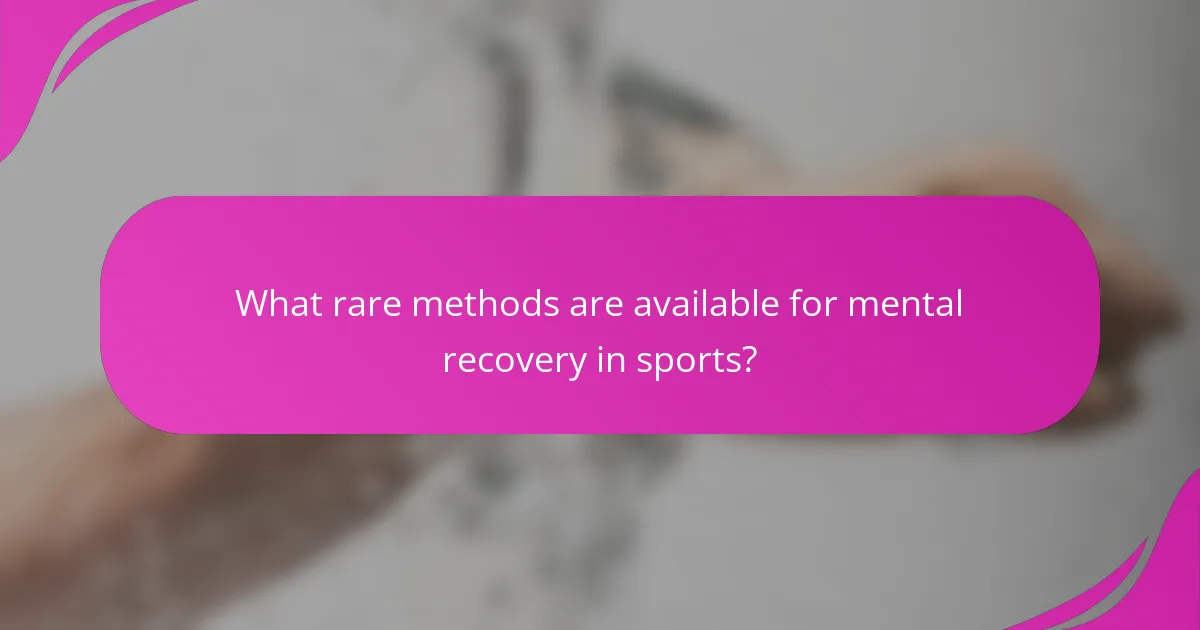
What rare methods are available for mental recovery in sports?
Mindfulness meditation, visualization techniques, and biofeedback are rare methods that can enhance mental recovery in sports. These approaches help athletes manage stress, improve focus, and regain confidence. Mindfulness meditation encourages present-moment awareness, reducing anxiety. Visualization techniques allow athletes to mentally rehearse their performance, fostering a positive mindset. Biofeedback provides real-time data on physiological responses, enabling athletes to control their mental state more effectively. Implementing these methods can lead to significant improvements in both recovery and performance.
How can biofeedback technology assist in managing mental fatigue?
Biofeedback technology effectively helps manage mental fatigue by providing real-time data on physiological functions. This feedback allows athletes to recognize stress responses and implement relaxation techniques. By training the mind to control physiological processes, users can enhance focus and reduce fatigue. Studies show that consistent biofeedback use improves mental resilience, leading to better athletic performance.
What unconventional therapies have shown promise in mental recovery?
Several unconventional therapies show promise for mental recovery, enhancing athletic performance. Techniques like art therapy, music therapy, and nature therapy help reduce stress and improve mental clarity. These approaches foster creativity and connection, aiding recovery from mental fatigue. For instance, art therapy encourages self-expression, while nature therapy promotes mindfulness. Integrating these therapies can lead to a holistic recovery strategy, addressing both mental and physical well-being.
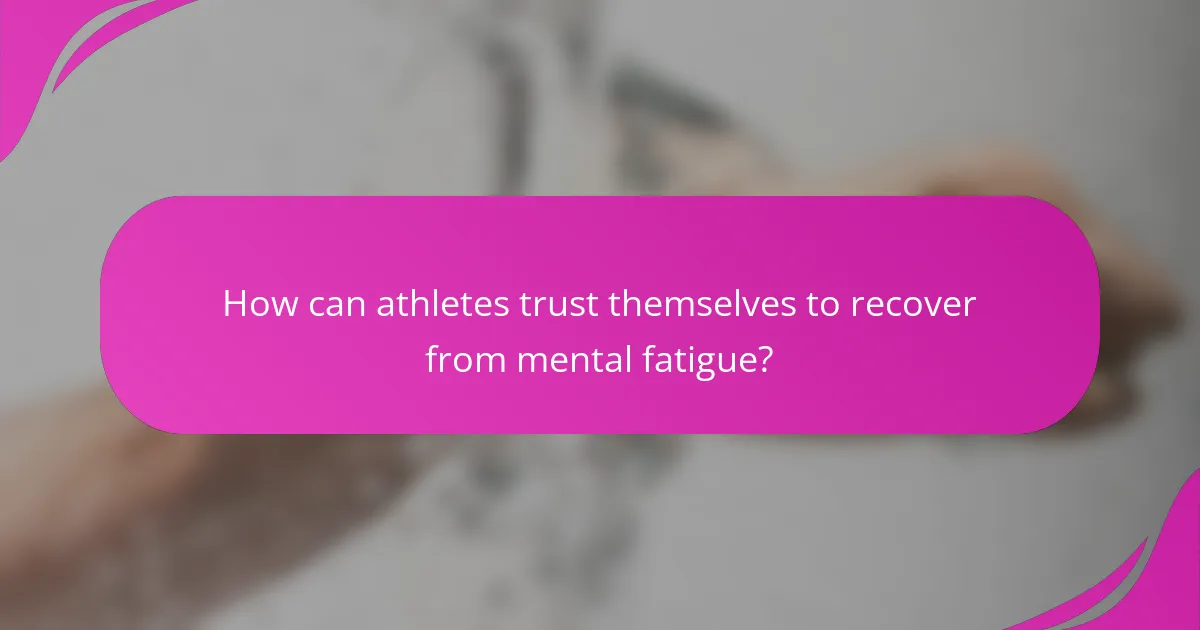
How can athletes trust themselves to recover from mental fatigue?
Athletes can trust themselves to recover from mental fatigue by developing a strong mindset, practicing self-compassion, and implementing effective recovery strategies. Mental resilience plays a crucial role in overcoming fatigue. Techniques such as mindfulness, visualization, and structured rest can enhance recovery. Establishing a routine that includes mental breaks and positive affirmations also fosters trust in one’s ability to bounce back. Regularly assessing mental states and adjusting training loads can prevent burnout and maintain performance.
What role does self-efficacy play in overcoming mental challenges?
Self-efficacy significantly enhances the ability to overcome mental challenges. It fosters resilience, enabling athletes to maintain motivation and focus during recovery. High self-efficacy leads to better coping strategies, allowing individuals to tackle mental fatigue effectively. Research indicates that athletes with strong self-efficacy experience improved performance outcomes and quicker recovery times. This psychological attribute empowers them to trust their abilities, ultimately enhancing their overall athletic performance.
How can athletes build a positive mindset for recovery?
Athletes can build a positive mindset for recovery by focusing on self-trust and mental resilience. Establishing a routine that includes mindfulness practices enhances awareness and reduces mental fatigue. Techniques such as visualization and positive self-talk can improve confidence and motivation. Additionally, setting realistic goals fosters a growth mindset, allowing athletes to view setbacks as opportunities for learning. Engaging in social support networks can further reinforce a positive outlook, as sharing experiences with peers boosts morale and accountability.
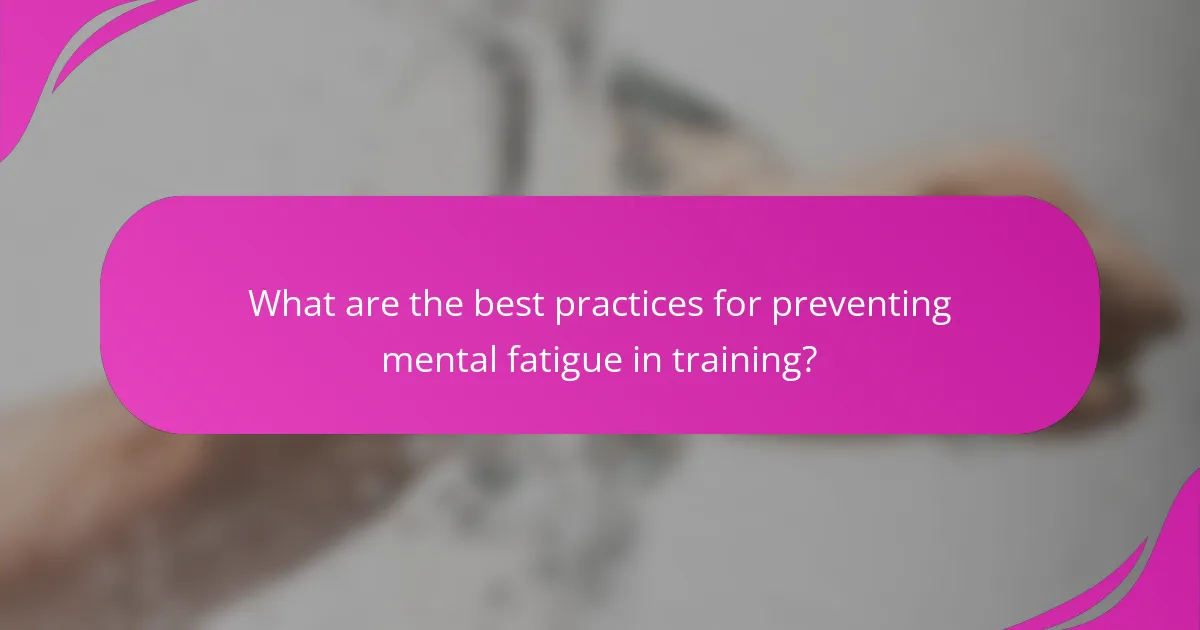
What are the best practices for preventing mental fatigue in training?
To prevent mental fatigue in training, prioritize rest, hydration, and nutrition. Incorporate mindfulness techniques and set realistic goals to maintain motivation. Regularly assess your mental state to identify stressors and adjust your training plan accordingly.
How can athletes balance training intensity and mental well-being?
Athletes can balance training intensity and mental well-being by prioritizing self-trust and recognizing mental fatigue. Understanding personal limits fosters better recovery and enhances performance. Incorporating rest days and mindfulness practices can effectively reduce stress and improve focus. Regularly assessing mental health and adjusting training plans accordingly ensures optimal balance.
What are common mistakes athletes make regarding mental recovery?
Athletes often overlook the importance of mental recovery, leading to common mistakes. They may neglect rest, believing constant training is essential. This mindset can exacerbate mental fatigue. Additionally, many athletes fail to implement relaxation techniques, which are crucial for recovery. Ignoring the signs of burnout is another frequent error, as athletes may push through mental exhaustion. Lastly, they might underestimate the impact of mental health on performance, leading to suboptimal results.
What expert insights can enhance mental resilience for athletes?
Trusting yourself is crucial for overcoming mental fatigue and enhancing athletic performance. Expert insights emphasize the importance of self-efficacy and positive self-talk. Research shows that athletes who practice visualization techniques can significantly reduce anxiety and improve focus during competition. Additionally, incorporating mindfulness strategies can help athletes manage stress and maintain mental clarity. These approaches foster resilience, enabling athletes to recover effectively and perform at their peak.